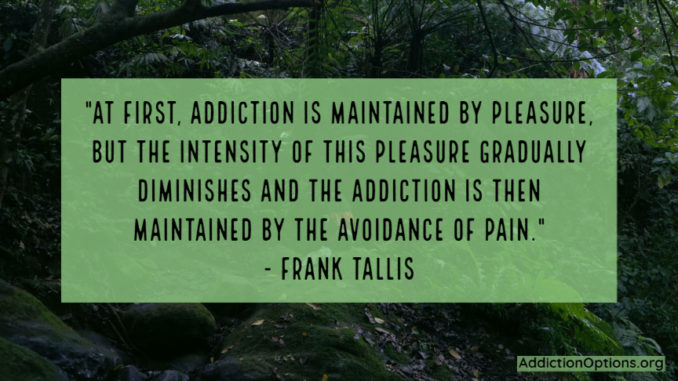
Have you ever wondered what exactly constitutes an opioid addiction? It can be confusing, since many people are not used to the term opioid. Opioids are often called opiates. These are pain-relieving medications derived from a variety of poppy plants. Opioids are typically prescribed to bring about the relief of intense or chronic pain. They do this by depressing, or slowing, the reactions that the body has to pain while releasing dopamine to allow the body to feel good. Since the medications provide feelings of relief and pleasure, many people use them more often than prescribed. Plus, the body can quickly stop feeling the same effects from opioids after a short time. Both of these issues can combine and lead to an addiction.
What Drugs Fall Under the Category of Opioids?
There are several medications that fall under the category of an opioid. These can include medications like:
- Oxycodone
- Morphine
- Fentanyl
- Codeine
- Methadone
One of the most common illegal drugs that also falls under the category of an opioid is heroin. The medications doctors prescribe have similar effects to their illegal counterpart, and for some people, an addiction can happen just as easily.
When a person who is in pain takes an opioid, they feel relief. They often feel happier as well due to the dopamine reaction that comes from the medication. It is similar to someone finding a lost item they have been searching for their whole lives. They are elated. From there, however, the feeling quickly fades. The person quickly begins feeling the need for more medication because they want that happy feeling again. This leads many to take their next dose a little early or to take a dose that is higher than they should just to recreate that feeling. That, in turn, starts the cycle of opioid addiction.
How to Tell if Symptoms Point to an Opioid Addiction
The easiest way to tell if someone is starting to experience opioid withdrawal is to stop taking them. If the body begins to crave more uncontrollably, that is the body saying it needs another dose. Most people feel sick to their stomachs and achy all over. Some develop a fever, while others profusely sweat and struggle with the chills. Many people also have problems keeping food down, and when they are able to eat, have diarrhea. The higher the dose the person took, the stronger the symptoms typically are. Medications like opioids alter the brain after taking enough of them. The opioid binds to opioid receptors and tells the brain that not enough medication is getting through. Then, it tells the body that the user must take a higher dose or take more medication early to get the same effect. The more medication the person takes, the stronger control it has over the user’s brain. This, unfortunately, can lead to an overdose.
Opioid Overdose Symptoms to Be Aware Of
The symptoms of an opioid overdose vary greatly. Most people face what experts refer to as the opioid overdose triad. This is a combination of three specific symptoms, including:
- Pinpoint pupils
- Struggle breathing
- Some level of unconsciousness
Those three symptoms, when combined, spell out that someone is likely showing opioid overdose symptoms. Medical attention should be sought out immediately in order to save this person’s life. It is also important to note that if someone goes from having symptoms that show an addiction to showing any of the triad symptoms, it is likely the user took a hefty dose and medical attention may become necessary. Anyone around the user should pay close attention to his or her actions, and if unsure, consult a doctor immediately.
Options to Overcome an Opioid Addiction
There are several options that people have when it comes to overcoming an addiction to opiates. First, there is the traditional option of rehab. This is always a great option, but it is not always feasible for everyone. Some are simply unable to afford it, while others do not have care for family members if they were to be gone a month or more. When rehab is not a realistic option, then self-care is the next best option. This is when you look around for substances that the body can get a similar reaction from, but from a safer source.
One option that many are considering is kratom. Kratom comes from trees, and many believe it provides incredibly similar results to taking an opioid. It can provide relief from pain, lower amounts of anxiety, and even help improve the struggle with depression for some. One strain of kratom that people have reported success with is red indonesian kratom. If you want to see if kratom would be ideal for you, speak with your physician. He or she can tell you if it would be safe for your specific set of circumstances. That way, you can make an informed decision.
Another option that many are considering is exercise. This may sound odd, but quite a few people have found getting over an opioid easier with exercise. The motion helps the body remove any leftover bits of the medication faster. This reduces the cravings and the need for the drug more rapidly than simply sitting there, waiting for the drug to work itself out. This can combine many forms of exercise, including:

- Meditation
- Cardio
- Yoga
- Pilates
- Walking
- Biking

The more active a person can be, the easier recovering becomes. Again, make sure this is safe according to your physician first, as being active could result in more pain.
Important Opioid Addiction Statistics To Remember
To understand the dangers of opioids, people need to see just how dangerous they can be. Hopefully these opioid addiction statistics can put the dangers in proper perspective.
- As of 2018 data, over 100 people died daily across just the U.S. from an opioid overdose.
- Approximately one-quarter of people who get an opioid prescription will misuse it at some point.
- 4 out of every 5 heroin users started out by misusing an opioid first.
- Approximately 5% of people who misuse an opioid will turn to heroin and become addicted.
Opioid addictions are serious. They hurt a lot of people and are incredibly dangerous. Many people get hooked quickly and then have no idea what options they have to stop. Now, there are more options than ever when it comes to kicking an opioid addiction.
